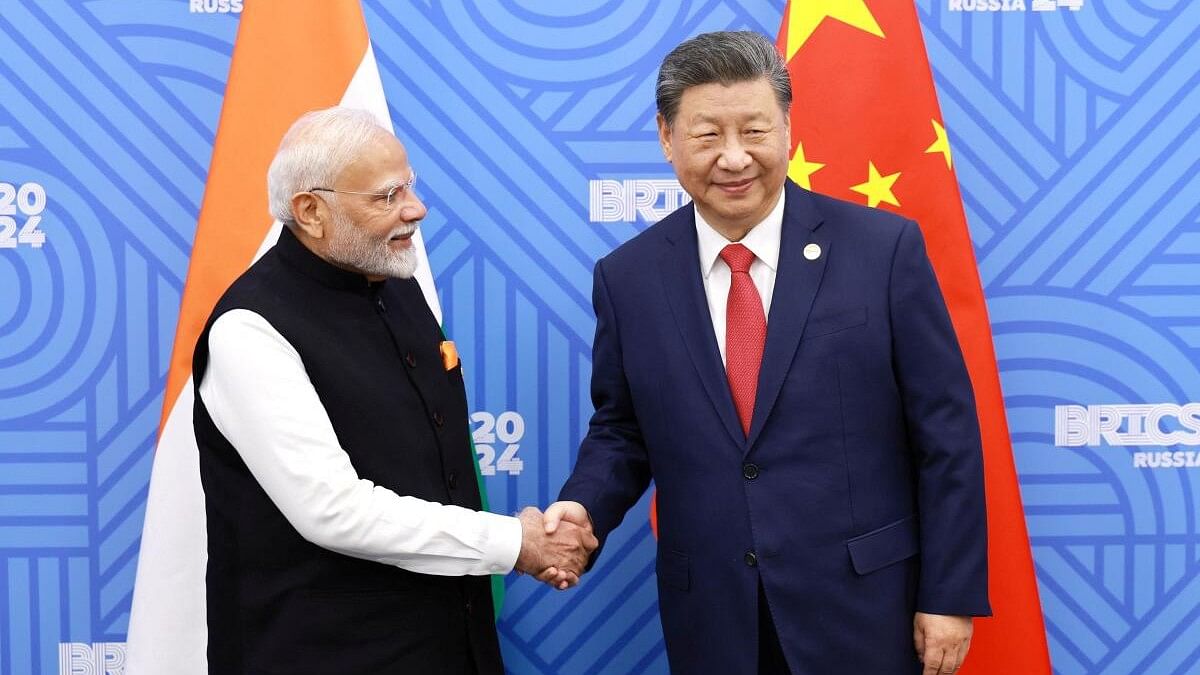
PM Narendra Modi shakes hands with Chinese President Xi Jinping on the sidelines of the BRICS summit in Kazan.
Credit: Reuters Photo
New Delhi: The special representatives of India and China will soon restart the stalled negotiation to resolve the boundary dispute between the two nations, Prime Minister Narendra Modi and President Xi Jinping agreed as they had their first formal bilateral meeting in five years at Kazan in Russia on Wednesday.
Modi welcomed the recent agreement on the arrangement for patrolling by the Indian Army and the Chinese People’s Liberation Army in Depsang and Demchok areas along the Line of Actual Control (LAC) and noted that the deal would complete the disengagement of troops and end the stand-off which started along the de facto boundary between the two nations in eastern Ladakh in April-May 2020.
He agreed with Xi that the “Special Representatives” of the two governments for negotiations to resolve the “India-China boundary question” would “meet at an early date to oversee the management of peace and tranquillity in border areas and to explore a fair, reasonable and mutually acceptable solution to the boundary question”, Foreign Secretary Vikram Misri told journalists after the meeting between the two leaders on the sideline of the 16th BRICS summit which was hosted by Russian President Vladimir Putin.
The special representatives of India and China have been holding talks to resolve the boundary dispute since October 2003. They concluded an Agreement on Political Parameters and Guiding Principles for the Settlement of the India-China Boundary Question in 2005. They have since been engaged in talks on a framework, albeit without much progress. Once they finalize the framework for settling the boundary dispute, it would be followed by actual demarcation of the border on the map.
The current special representatives – Modi’s National Security Advisor Ajit Doval and Chinese Foreign Minister Wang Yi – had held the 22nd round of negotiations in New Delhi in December 2019. The negotiation was stalled after the military stand-off started along the LAC in eastern Ladakh in April-May 2020. Though they were in touch and met on a few occasions, the two special representatives did not have any formal round of negotiation in the past five years.
New Delhi and Beijing on Wednesday also signalled willingness to bring the relations back on track. The two leaders agreed that the “relevant dialogue mechanisms at the level of the foreign ministers and other officials would also be utilized to stabilize and rebuild bilateral relations”.
“We believe that the importance of India-China relations is not just for our people. Our relations are also important for global peace, stability and progress,” Modi told Xi, adding: “Mutual Trust, Mutual Respect, and Mutual Sensitivity should continue to be the basis of our relations”.
“They agreed to view and handle China-India relations from a strategic height and long-term perspective, prevent specific disagreements from affecting the overall relationship, and contribute to maintaining regional and global peace and prosperity and to advancing multipolarity in the world,” Hua Chunying, the spokesperson of the Ministry of Foreign Affairs of the Chinese Government, posted on X after the meeting.
Modi and Xi had last formally met at Mamallapuram near Chennai in October 2019 when they had held the second ‘informal summit’, a sequel to a similar meeting the two had held at Wuhan in China in April 2018, less than a year after the 75-day-long stand-off between the Indian Army and the Chinese PLA at Doklam Plateau in western Bhutan. But after the aggressive moves by the Chinese PLA along the LAC in eastern Ladakh and the countermeasures by the Indian Army in April-May 2020 had resulted in another stand-off, the relations between New Delhi and Beijing had again nosedived. The two leaders had no formal bilateral meeting in the last five years, except brief chats on the sidelines of the G20 summit in Bali in November 2022 and the BRICS summit in Johannesburg in August 2023.
Though protracted negotiations led to the mutual withdrawal of frontline troops by both the Indian Army and the Chinese PLA from Galwan Valley by July 2020, northern and southern banks of Pangong Tso by February 2021, Gogra Post by August 2021, and Hot Springs by September 2022, the negotiation to resolve the stand-off in Depsang and Demchok remained stalled over the past 24 months.
The PLA troops deployed in Depsang, well inside the territory of India along the LAC with China, continued to block the Indian Army’s access to Patrolling Points 10, 11, 12, 12A, and 13. A similar stand-off also continued in Demchok.
The agreement New Delhi and Beijing reached on Monday – setting the stage for the Modi-Xi meeting at Kazan in Russia – would allow the Indian Army troops to patrol in and around Depsang and Demchok as they had been doing before the Chinese PLA’s aggressive moves in April-May 2020. The deal would also allow the local farmers to go for cattle grazing in the areas.
The deal, however, would not end the patrolling moratorium that the Indian Army and the Chinese PLA had mutually agreed upon while creating buffer zones in Galwan Valley, northern and southern banks of Pangong Tso, Gogra Post and Hot Springs.
“Restoration of peace and tranquillity in the border areas will create space for returning towards the path of normalization. What I meant by that is, with the recent agreements, the path has now opened, and it is necessary for both of us to continue on this path,” Misri, the foreign secretary, told journalists in Kazan. “As far as the question of trust is concerned, through the processes and actions between both sides, we hope that trust will increase between us.”
